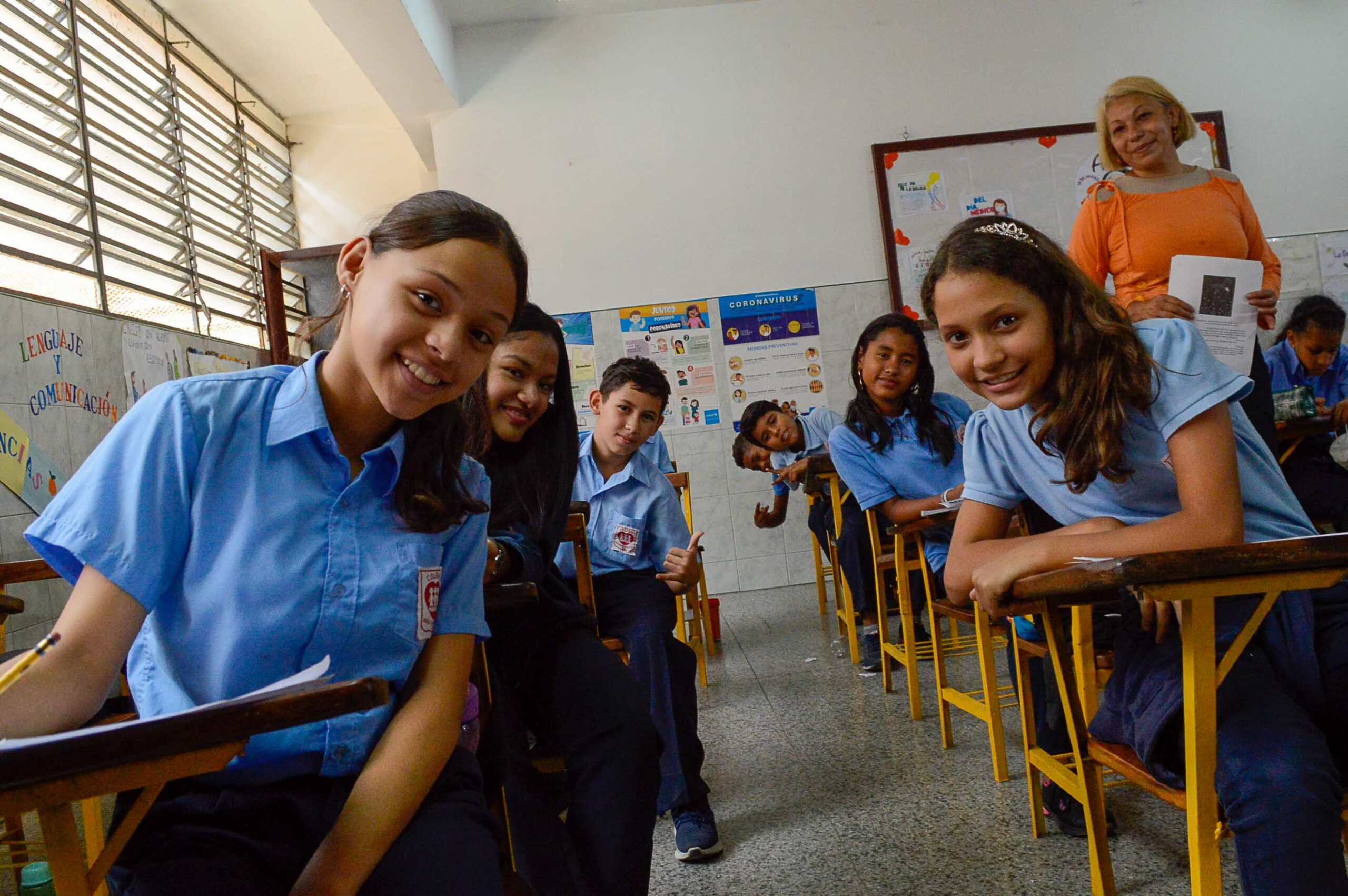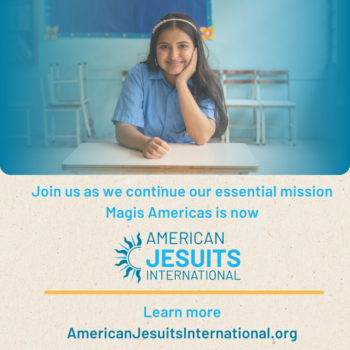The Magis Americas Board of Directors has reaffirmed our commitment to promoting access to quality and inclusive education opportunities for people living in marginalized and impoverished communities with a commitment of over $280,000 in funding for nine education projects in Latin America. This round of project approvals is a historic step for our organization as it marks the first time Magis Americas has allocated significant unrestricted funding in support of one of our key priority areas.
“This round of project proposals is a clear commitment by our staff and Board of Directors to support Jesuit education initiatives, particularly those led by our partners at Fe y Alegría,” said Executive Director Nate Radomski. “The projects approved this cycle are particularly inspiring. Teacher formation programs and promoting inclusive accessible education for students with disabilities are two areas where our support can make a real difference in the communities where Fe y Alegría is working.”
Projects Coordinator Ixchel Palencia, with the support of the MA team and Board Projects Committee, has worked with our project partners to identify specific opportunities for improvement and connect them with funding opportunities in the United States. The approved projects will support initiatives in countries such as Haiti, Venezuela, El Salvador, and the Dominican Republic. Below is a brief summary of the approved proposals.
Inclusive Environments for Female Students and Individuals with Disabilities
“Equal Opportunities for Girls and Women Living in Rural Areas to Enhance Participation and Social Integration” (Fe y Alegría Nicaragua)
Equal opportunities for girls, adolescents, and women in rural areas of Nicaragua, particularly in the Autonomous Regions of the South and North Caribbean Coast, is a key priority for Fe y Alegría Nicaragua. Recognizing the enduring gender inequality in the country, especially in rural settings, this project aims to address barriers impacting women’s access to education, employment, and overall well-being. Specifically, funding will facilitate business initiatives led by rural women through seed capital for equipment and materials essential to these initiatives, contributing to the empowerment and economic advancement of women in these regions.
“Removing Barriers – Creating Opportunities for a More Inclusive Education” (Fe y Alegría Argentina)
This project encompasses three main components: Baseline and diagnostics, teacher training processes involving educational psychologists and social workers, and engagement with the educational community, families, and the inclusive education network.
The first action involves assembling a team of educational psychologists specializing in disabilities and learning difficulties in Embarcación, Bella Vista, and a shared team for the six early childhood centers in Quilmes. These specialists, alongside existing FyA staff and teachers, will form interdisciplinary teams at each location to launch a diagnostic survey to inform the other stages of the project.
Consequently, teacher training workshops and psychosocial staff will focus on early detection strategies and inclusive pedagogy.
Finally, the teams will engage with the educational communities surrounding each school to foster an inclusive education network. This involves raising awareness among families about the educational inclusion of children with disabilities or learning difficulties.
“Removing Barriers – Accompaniment to the Inclusion of Students with Disabilities at the Colegio San Adolfo” (Fe y Alegría Uruguay)
Fe y Alegría Uruguay initiated a project in 2022 aiming to foster inclusive education at Colegio San Adolfo. Creática, an experienced educational institution specializing in technical aids for marginalized individuals, will work with teachers at Colegio San Adolfo to promote the inclusion of all students by enhancing their technological skills. The project aims to equip all teaching staff with tools for fostering inclusion and to promote awareness of inclusion and disability within the educational community.
Fe y Alegría Uruguay is focused on five outcomes: understanding student needs, enhancing teacher training, developing personalized intervention plans for students with severe disabilities, integrating technology into inclusive educational spaces, and providing support and guidance to families.
Teacher Formation and Support
“Support for Fe y Alegría Venezuela’s Commitment for Teachers” (Fe y Alegría Venezuela)
A salary supplement, specifically targeting support for school transportation, has been proposed to increase teacher retention rates of crucial staff and teachers across six schools within the Fe y Alegría network.
The incentives provided to school personnel are strategically directed towards transportation assistance, serving as a means to facilitate and encourage teachers’ regular attendance at school and their active participation in training activities. This approach seeks to alleviate the adverse effects of low teacher salaries, fostering a more sustainable and supportive educational environment. The teaching staff who will benefit from this transportation stipend work in schools that are located in crucial border states, including Táchira, Sucre, Anzoátegui, and Zulia.
“Training Teachers and Counselors to Enhance Literacy Competencies and Support Special Education Needs” (Fe y Alegría Dominicana)
We will work with Fe y Alegría Dominican Republic to provide two different types of formation to teachers and staff at the Santo Niño Jesús Educational Center in Batey Lechería.
First, teachers will receive essential training to enhance students’ literacy competencies. Through targeted pedagogical programs, our project seeks to empower educators with effective strategies applicable in the classroom which foster a learning environment that promotes literacy skills among students.
Second, the guidance and psychology teams will develop news skills required to identify and offer appropriate support to students with distinct educational needs. By fortifying these teams, Fe y Alegría hopes to create a more inclusive and equitable educational environment which ensures all students, regardless of their individual needs, receive the necessary attention and support to thrive in their academic pursuits.
“Improving Basic Conditions for Developing Educational Potential in Quispicanchi, Cusco” (Fe y Alegría Perú)
The Fe y Alegría 44 Rural Education Project (PERFAL 44) encompasses a network of 25 rural schools situated in the Quispicanchi province of Cusco, Peru. Spanning 60 km to 150 km from the city of Cusco, these schools have a travel time ranging from one to three hours. Teachers residing in Cusco commute weekly to these rural institutions, staying Monday to Thursday in the school as there is no access to housing arrangements in the communities. Over the years, wear and tear require refurbishments of teacher’s houses doubling as living and office spaces which ensure teacher availability throughout the week. Our project will provide resources for these essential improvements.
At the same time, Connectivity emerges as an urgent need, with the absence of internet access hindering education. Last year, internet antennas were installed in Ccoya and Ccoñamuro schools. However, funding constraints for 2024 prevented continuing this service. The Ministry of Education has yet to recognize the necessity of internet service in rural schools, exacerbating the educational gap. This project will also provide funding to cover the gap between the needs of the community and the resources available through public funding, ensuring internet access for 752 school-aged students.
“Pedagogical Mentoring for the Transformation of Teaching Practice” – (FIFyA Regional)
Fe y Alegría will launch a pilot project in five countries (Ecuador, Argentina, Guatemala, Dominican Republic, and Bolivia) focused on improving learning processes for children in schools facing exclusion, by enhancing leadership skills and improving teaching processes amongst staff.
Training programs will be offered for pedagogical accompaniers, teachers, and directors through the Pedagogical Mentoring Program of Diego Portales University. This program spans two years and involves theoretical-practical training, including modules on contexts and challenges, fundamentals of mentoring, practicum, and professional capacity development. Extensive practice in schools, sustainable installation support, and specialized advice for supporters are also provided.
Improving Conditions and Ensuring Access to Education
“Plan for Security in Haiti” (Foi et Joie Haiti)
SACHO Consulting will spearhead a project aimed at developing a comprehensive security protocol for FyA Haiti, integrating a thorough risk analysis. Workshops with the team and threat assessments will inform the establishment of policies and controls to address vulnerabilities. Subsequently, a hands-on workshop for staff, featuring simulations and exercises, will ensure a practical understanding and application of the protocol. Continuous monitoring and adjustments by the consultant will further enhance organizational security.
“Integral Formation for Students in El Salvador at the CIE/UCA 2024” (Centro Ignacio Ellacuría)
The integral formation (Ignatian Pedagogy) for students from the Centro Ignacio Ellacuría aims to support the participation of 44 students in the Ellacuría and Casa de las Américas programs throughout 2024. These programs provide students with academic learning, as well as the development of social, communication, and emotional intelligence skills by interacting with other students and with vulnerable populations in El Salvador.
Centro Ignacio Ellacuría (CIE) has developed programs that integrate exploring faith and promotion of justice through an education based on a liberating praxis that connects the national reality with academics.
The Casa de las Americas program has a duration of 3 months with a focus on a praxis education experience in social, economic, political, and cultural problems at the community, country, regional, and global levels.
The Ellacuria Program, with a duration of 5 months, allows students to live in community and support communities affected by poverty. In this program, there is an opportunity to share with other UCA students, from different programs, by living in a house in Antiguo Cuscatlan. The formation allows students to 1) provide weekly accompaniment to communities 2) live according to values of simplicity and participate in nightly community activities, and 3) receive Ignatian Spirituality formation, which integrates the students’ experiences with their spirituality.
This formation contributes to their professional, personal, and spiritual growth and integration to the community.
CIE has traditionally been funded by alumni of the Casa de la Solidaridad program, which are primarily individuals in the United States.

